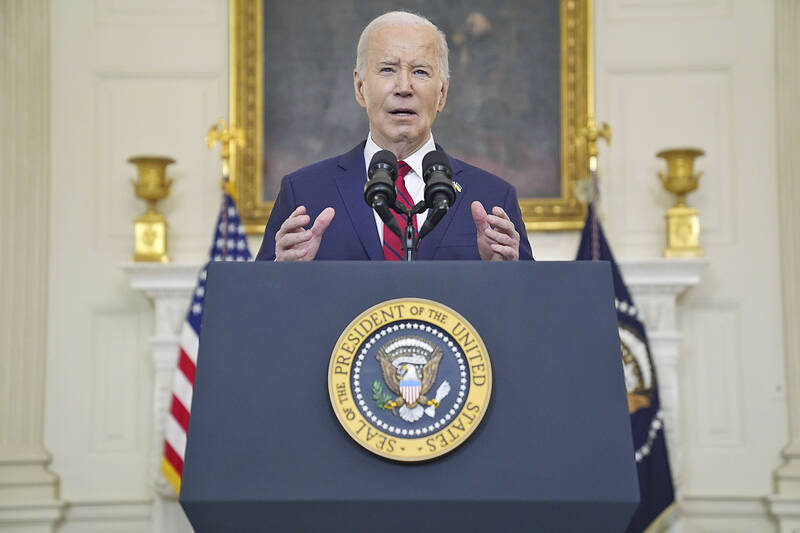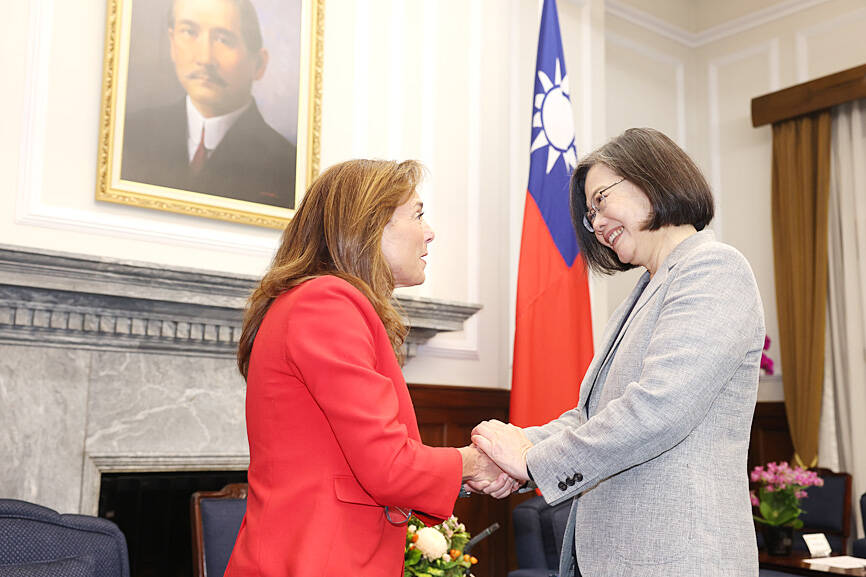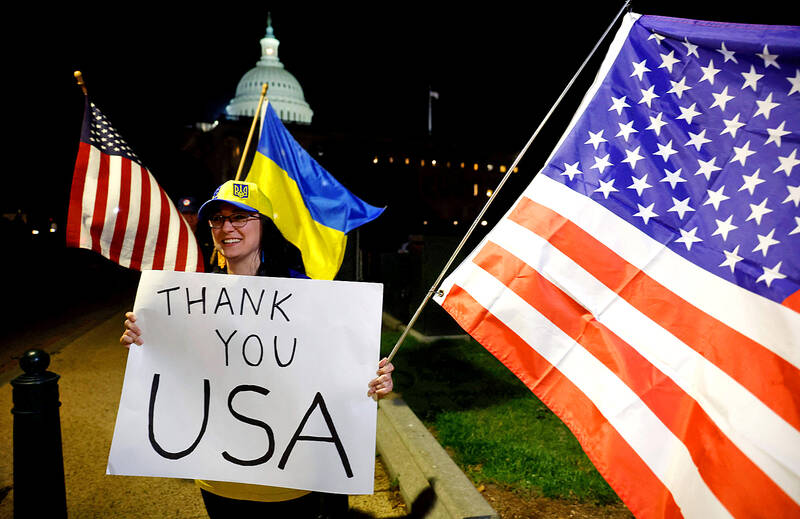The US Senate on Tuesday approved US$95 billion in aid to Taiwan, Ukraine and Israel, with the package of bills containing the funding expected to be signed into law after press time last night.
The Senate passed the bills in a 79-18 vote after the US House of Representatives on Saturday approved the package, which US President Joe Biden said he would sign.
“Tonight, a bipartisan majority in the Senate joined the House to answer history’s call at this critical inflection point,” Biden said.

Photo: AP
The legislation would send US$26 billion in wartime assistance to Israel and humanitarian relief to citizens of Gaza, and US$8 billion to counter Chinese threats to Taiwan and in the Indo-Pacific.
US officials said that about US$1 billion of the aid package could be on its way shortly, with the bulk following in coming weeks.
In Taipei yesterday, President Tsai Ing-wen (蔡英文) thanked the US for its support, including the Senate’s action, in a meeting with a US delegation.

Photo: CNA
Taiwan will continue to work with the US and other countries to bolster the “pan-democratic alliance,” and create global prosperity and stability, Tsai told the delegation at the Presidential Office.
Tsai thanked the delegation, which comprises US representatives Lisa McClain, Dan Kildee and Mark Alford, for their efforts to advance legislation that would support Taiwan’s participation on the international stage.
She also thanked the US House of Representatives for its work to advance the Indo-Pacific Security Supplemental Appropriations Act, which would allocate funding for continued Taiwan-US collaboration.

Photo: AFP
Tsai also thanked the delegation members for their roles in enhancing Taiwan-US collaboration.
With this year marking 45 years since the US’ Taiwan Relations Act became law, Taiwan and the US should boost their collaborations to contribute to peace and stability in the Indo-Pacific region, and to limit authoritarian expansion, she said.
Tsai reiterated the nation’s gratitude for Washington’s military sales to Taiwan based on the “six assurances” and the Taiwan Relations Act.
In addition to completing the first batch of agreements under the US-Taiwan Initiative on 21st-Century Trade, hopefully the US-Taiwan Expedited Double-Tax Relief Act would be finalized soon, Tsai said, adding that the two sides are important trade partners.

ENDEAVOR MANTA: The ship is programmed to automatically return to its designated home port and would self-destruct if seized by another party The Endeavor Manta, Taiwan’s first military-specification uncrewed surface vehicle (USV) tailor-made to operate in the Taiwan Strait in a bid to bolster the nation’s asymmetric combat capabilities made its first appearance at Kaohsiung’s Singda Harbor yesterday. Taking inspiration from Ukraine’s navy, which is using USVs to force Russia’s Black Sea fleet to take shelter within its own ports, CSBC Taiwan (台灣國際造船) established a research and development unit on USVs last year, CSBC chairman Huang Cheng-hung (黃正弘) said. With the exception of the satellite guidance system and the outboard motors — which were purchased from foreign companies that were not affiliated with Chinese-funded

PERMIT REVOKED: The influencer at a news conference said the National Immigration Agency was infringing on human rights and persecuting Chinese spouses Chinese influencer “Yaya in Taiwan” (亞亞在台灣) yesterday evening voluntarily left Taiwan, despite saying yesterday morning that she had “no intention” of leaving after her residence permit was revoked over her comments on Taiwan being “unified” with China by military force. The Ministry of the Interior yesterday had said that it could forcibly deport the influencer at midnight, but was considering taking a more flexible approach and beginning procedures this morning. The influencer, whose given name is Liu Zhenya (劉振亞), departed on a 8:45pm flight from Taipei International Airport (Songshan airport) to Fuzhou, China. Liu held a news conference at the airport at 7pm,

Authorities yesterday elaborated on the rules governing Employment Gold Cards after a US cardholder was barred from entering Taiwan for six years after working without a permit during a 2023 visit. American YouTuber LeLe Farley was barred after already being approved for an Employment Gold Card, he said in a video published on his channel on Saturday. Farley, who has more than 420,000 subscribers on his YouTube channel, was approved for his Gold Card last month, but was told at a check-in counter at the Los Angeles International Airport that he could not enter Taiwan. That was because he previously participated in two

SECURITY RISK: If there is a conflict between China and Taiwan, ‘there would likely be significant consequences to global economic and security interests,’ it said China remains the top military and cyber threat to the US and continues to make progress on capabilities to seize Taiwan, a report by US intelligence agencies said on Tuesday. The report provides an overview of the “collective insights” of top US intelligence agencies about the security threats to the US posed by foreign nations and criminal organizations. In its Annual Threat Assessment, the agencies divided threats facing the US into two broad categories, “nonstate transnational criminals and terrorists” and “major state actors,” with China, Russia, Iran and North Korea named. Of those countries, “China presents the most comprehensive and robust military threat